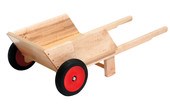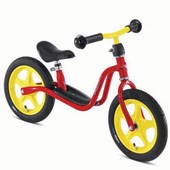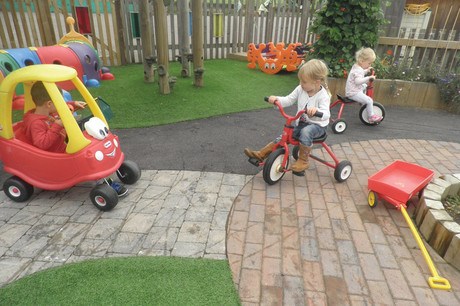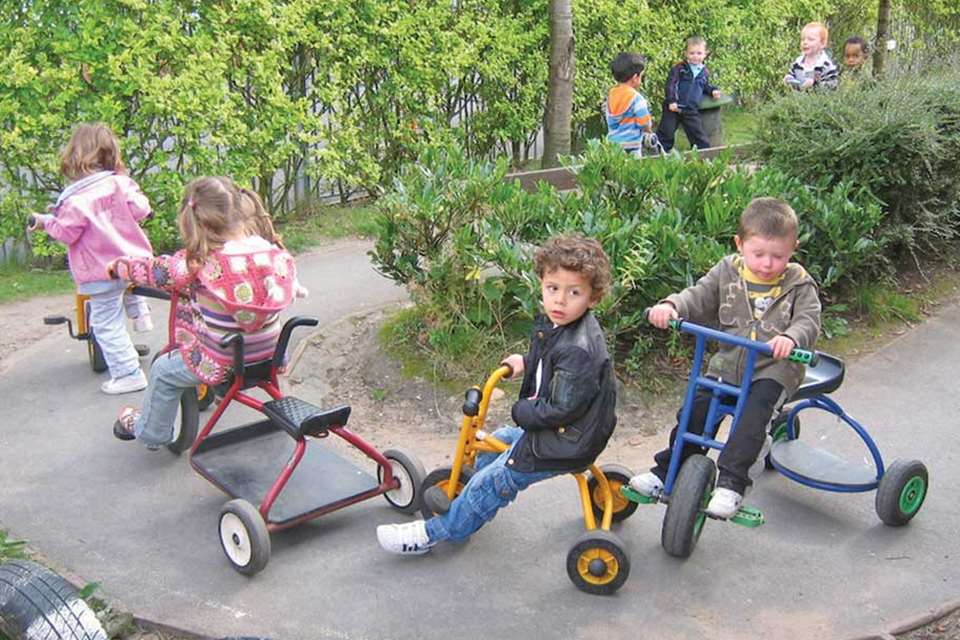Nursery Equipment: Wheeled Toys - Hot wheels
Nicole Weinstein
Monday, May 16, 2016
Providing bikes and scooters helps children develop vital physical skills, as well as perseverance and negotiation – while other wheeled resources are also useful, Nicole Weinstein explains

Four-year-old Arif arrives at nursery school beaming with pride as he rides his bike without stabilisers through the school gates. The bike is owned by the nursery, which lends out its bikes, balance bikes and scooters to children as part of a project aimed at developing children’s skills in riding two-wheeler balance and pedal bikes.
Becky Dolamore, head teacher at Rachel Keeling Nursery School in Tower Hamlets, says, ‘Many of our children live in high-rise buildings and don’t have access to a garden or their own wheeled toys. As a result, their physical development is often below the expected levels when they start at nursery school.
‘We observed that the wheeled toys, particularly the bikes, were very popular with the children when playing outdoors, but that they needed support and more experience to move on their skills in this area.’
The bikes and scooters are part of the setting’s continuous provision and the children have focused time riding them at the nursery and the local park. ‘We consulted the children every step of the way,’ explains Ms Dolamore. ‘They came with us to the shop to buy our Puky balance bikes, along with helmets, and when they were more proficient we bought Ridgeback light-weight pedal bikes.
‘The project has been fruitful in so many ways. It supports so many areas of learning. Not only has it helped develop children’s confidence as they’re so proud to have mastered a new skill, whether it be learning to pedal, scoot or ride a bike without stabilisers, but it also helps with skills such as perseverance, being willing to have a go, being able to communicate and share their learning journey videos and photos with peers and parents.
‘Also, the physical act of cycling helps develop physical awareness, peripheral vision, ability to take turns and the physical skills of balancing, peddling and negotiating space.’
NEGOTIATING SPACE
Unlike many nursery settings that have a designated day or time of day for bike play, Ms Dolamore insists that it is more productive to embed the use of scooters and bikes into high-quality core provision. ‘There’s not the usual frenzy around bike play because they are out every day. Also, practitioners have taken a targeted approach to supporting children’s development in this area, by working with small groups. There are lots of visual aids to remind children whether today is their day on the bikes. Being a 100-place nursery school, we can’t operate on a one-in one-out basis, and our children understand that.’
The nursery has a large outdoor area with some tricky paths, with fallen oak trees and slopes that create a challenge, but there is no designated area for bike play. ‘We don’t have a track; the bikes are intermingled with other play. This is important – we want young cyclists to learn to respect other people, so the children learn to negotiate the space in the garden.
‘In terms of preventing accidents where possible, it’s really important that children are taught skills to minimise accidents, such as looking where they are going and responding and negotiating carefully.’
Understanding how a bike works and what to do if it is broken are also part of the learning process. The school bought bike repair kits, and the children help repair the punctures with practitioners or they take them to the bike shop to be fixed.
The nursery school has signed up with the Transport for London STARS programme, which promotes active travel– and is hoping to become a Bike It School, which will give it access to workshops and guidance from a local representative. For more information, go to:
https://stars.tfl.gov.uk/PublicPages/Home.aspx
www.sustrans.org.uk/our-services/where-we-work/schools
CORE PROVISION
Most settings have wheeled toys of one kind or another, and many implement programmes of planned access. For example, this may be for only three days a week, or only mornings, so their space is not dominated by wheeled toys all day, every day.
However, Julie Mountain, director of Play Learning Life, says playing with wheeled toys is still undervalued and that settings don’t always make links between the physical activity of riding and other areas of children’s development.
 She believes a selection of wheeled items should form part of continuous provision. She says, ‘Settings should think beyond bikes and trikes when looking to purchase new resources. They should think of pedalless bikes, two and three-wheel scooters, dolls’ pushchairs and prams, toddler ride-alongs, trolleys, trailers, wheelbarrows and garden carts, loose tyres and even storage units on wheels or a couple of trundle wheels.
She believes a selection of wheeled items should form part of continuous provision. She says, ‘Settings should think beyond bikes and trikes when looking to purchase new resources. They should think of pedalless bikes, two and three-wheel scooters, dolls’ pushchairs and prams, toddler ride-alongs, trolleys, trailers, wheelbarrows and garden carts, loose tyres and even storage units on wheels or a couple of trundle wheels.
‘I have three of these and children of all ages love running up and down with them, clicking and counting as they go.’
Here are some of her suggestions on how to incorporate wheeled toys into your continuous provision:
The crucial elements of wheeled toys provision are abundance and variety. A wide variety of items means that most children will find a wheeled vehicle they are interested in using.
An abundance of wheeled toys means more opportunities for collaborative, communicative play and fewer opportunities for conflict caused by the need to always wait, share and take turns.
Carts, trolleys and trailers provide social and role play opportunities, but from a physicality perspective they also promote upper-body strength and co-ordination as children load and unload and negotiate obstacles as they transport their cargo across the garden. Some children – perhaps more than we appreciate – don’t have access to wheeled toys at home, so the provision in the setting is vital for them.
The physicality aspect is important but not the only factor in favour of wheeled toy provision. Clever integration of wheeled items into everyday play should see children including them in their imaginative play, incorporated into maths games – distance, speed, number, timing, direction, parking spaces – and used to help set up and clear away the outdoor space at the start and end of sessions.
Balance, stamina, strength and control are key parts of successful bike riding, and in ways that cannot easily be developed in other ways. Effective pedalling demands co-ordination from both sides of the body, alternately, which requires both sides of the brain to co-operate.
Pedalling or pushing and pulling across a variety of surfaces, and managing different levels and steps, demand different skills from those used on the climbing frame.
 BEST BUYS: RACHEL KEELING NURSERY SCHOOL
BEST BUYS: RACHEL KEELING NURSERY SCHOOL
The school recommends:
Puky balance bikes, www.puky.net
Ridgeback light-weight bikes, www.ridgeback.co.uk
IN THE MARKETPLACE
Encourage collaborative play by having two-seaters, trailers and trucks such as the Rabo Chariot and Taxi (£421.85) from YPO, www.ypo.co.uk. Add other toys such as the Childsize Wheelbarrow (£155) from www.communityplaythings.co.uk, or the Small Wheelbarrow (2 wheels, £30.30) from www.wesco-eshop.co.uk, which children can use to transport books and natural materials.
Provide a variety of scooters – three-wheeled ones such as Micro, www.micro-scooters.co.uk; and Mini Viking Scooter (£79.25) from www.cosydirect.com– a limited number of bikes with pedals, preferably unisex versions, and a range of different-sized trikes, such as the TTS Pedal Trike (£154.95) from www.tts-group.co.uk or the Viking Tricycle (from £167.49) by Cosy Direct.
Try the MiniTrike Bike Little Brian by Brian Clegg (£68) from Essentials for Education, www.essentialsforeducation.co.uk. The Little Brian range has been specifically designed for children aged between one and four years.
BUSHY LEAZE CHILDREN & FAMILIES CENTRE IN ALTON

Patti Snook, head of Bushy Leaze Children & Families Centre in Alton, Hampshire, says, ‘We recently redeveloped our outdoor area to include a specific track incorporating more challenge with an uphill and downhill slope. There is a wooden bridge and children gather speed when coming off the bridge and downhill. The children have set times – Monday and Tuesday is for bikes and trikes, and Wednesday, Thursday and Friday are for all other wheeled toys. It is fully inclusive and the SEN children, who represent 50 per cent of this 60-place nursery, have greater time and variety outside as a result of the wheeled toys and new garden area.’
 Its recommended vehicles include Little Tikes vehicles, Scooter boards (£19.99, available from Sensory Direct, www.sensorydirect.com) and Creeper scooters (£239.96 for a four-pack, available from Findel Education, www.findel-education.co.uk).
Its recommended vehicles include Little Tikes vehicles, Scooter boards (£19.99, available from Sensory Direct, www.sensorydirect.com) and Creeper scooters (£239.96 for a four-pack, available from Findel Education, www.findel-education.co.uk).






